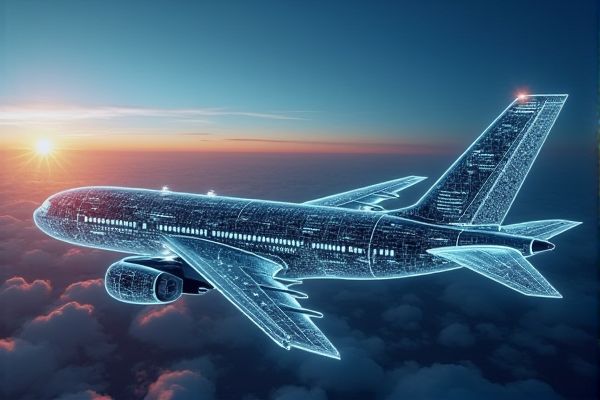
AI applications in the aerospace industry enhance efficiency and safety through advanced data analytics and machine learning algorithms. Predictive maintenance utilizes AI to analyze sensor data, anticipating equipment failures and minimizing downtime, which significantly improves operational reliability. AI-powered design tools facilitate the creation of innovative aircraft and components, optimizing performance and fuel efficiency during the development phase. Furthermore, autonomous systems, including drones and automated air traffic management, leverage AI to streamline logistics and enhance airspace safety.
AI usage in aerospace industry
Predictive Maintenance
Predictive maintenance in the aerospace industry leverages AI algorithms to analyze data from various systems and components of aircraft. By monitoring sensor data, airlines can anticipate equipment failures and schedule maintenance before issues arise, potentially reducing downtime. For instance, Boeing has implemented predictive maintenance solutions to enhance operational efficiency and safety. This approach not only minimizes costs but also improves flight reliability and passenger satisfaction.
Autonomous Drones
The aerospace industry is increasingly adopting AI technologies, particularly in the development of autonomous drones. These drones can significantly enhance efficiency in tasks such as surveillance, cargo transport, and infrastructure inspection. By automating these operations, organizations like Boeing could reduce operational costs and improve safety. The integration of AI allows for advanced data analysis, increasing the chances of optimizing flight paths and resource management.
Flight Path Optimization
Flight path optimization can significantly enhance fuel efficiency and reduce operational costs in the aerospace industry. AI algorithms analyze vast amounts of data, allowing for real-time adjustments to flight routes based on weather patterns and air traffic. Airlines such as Delta Air Lines are already exploring AI applications to streamline their operations and improve overall flight performance. The integration of AI technology presents the opportunity to not only save money but also minimize the environmental impact of aviation.
Air Traffic Management
AI can enhance air traffic management by optimizing flight schedules and reducing delays. By analyzing real-time data, algorithms can predict congested air routes, allowing for smoother traffic flow. For instance, systems like NASA's Unmanned Aircraft System Traffic Management aim to improve efficiency and safety in controlled airspace. The possibility of implementing AI solutions could lead to significant cost savings and improved operational performance in aerospace.
Fuel Efficiency Analysis
AI technology can significantly enhance fuel efficiency analysis in the aerospace industry. Advanced algorithms can process vast datasets from various aircraft models, identifying optimal flight paths and improving fuel consumption. For instance, airlines like Delta can leverage AI systems to predict fuel needs based on real-time weather data. This approach not only reduces operational costs but also contributes to environmentally friendly practices by minimizing carbon emissions.
Safety Enhancement Systems
AI usage in the aerospace industry could significantly enhance safety through advanced Safety Enhancement Systems. These systems can analyze vast amounts of flight data from aircraft like the Boeing 787 to predict potential failures before they occur. Predictive maintenance can be optimized, leading to reduced downtime and increased safety for passengers and crew. Implementing AI technologies in air traffic management may also improve situational awareness and decision-making during emergencies.
Supply Chain Optimization
AI can enhance supply chain optimization in the aerospace industry by improving demand forecasting and inventory management. For instance, companies like Boeing utilize machine learning algorithms to analyze complex data patterns, allowing for better decision-making. This technology can lead to reduced operational costs and increased efficiency in logistics. The possibility of real-time tracking and predictive maintenance further presents advantages in maintaining a seamless supply chain.
Human-Machine Collaboration
AI usage in the aerospace industry enhances human-machine collaboration, allowing for improved efficiency and safety in operations. For instance, companies like Boeing utilize AI algorithms to optimize flight patterns and maintenance schedules. This integration increases the potential for reduced operational costs and shorter delivery times. The chance of fostering innovative solutions in design and manufacturing processes also rises, leading to a more competitive edge in the market.
Design and Simulation
AI can enhance design and simulation processes in the aerospace industry by optimizing aerodynamic shapes and materials for improved performance. For example, using AI algorithms in software like ANSYS can lead to more efficient simulations, reducing the time required for testing various designs. This capability allows engineers to explore a wider array of design possibilities, increasing the chance of discovering innovative solutions. Overall, the integration of AI holds the potential to streamline workflows and improve project outcomes in aerospace engineering.
Crew Scheduling and Management
AI can optimize crew scheduling in the aerospace industry by analyzing flight data, crew availability, and regulatory requirements. For example, airlines like Delta can leverage AI algorithms to reduce downtime and enhance crew efficiency. It may lead to improved operational performance and increased satisfaction among crew members. This technology has the potential to streamline processes, ultimately benefiting airline profitability and service quality.
 techknowy.com
techknowy.com